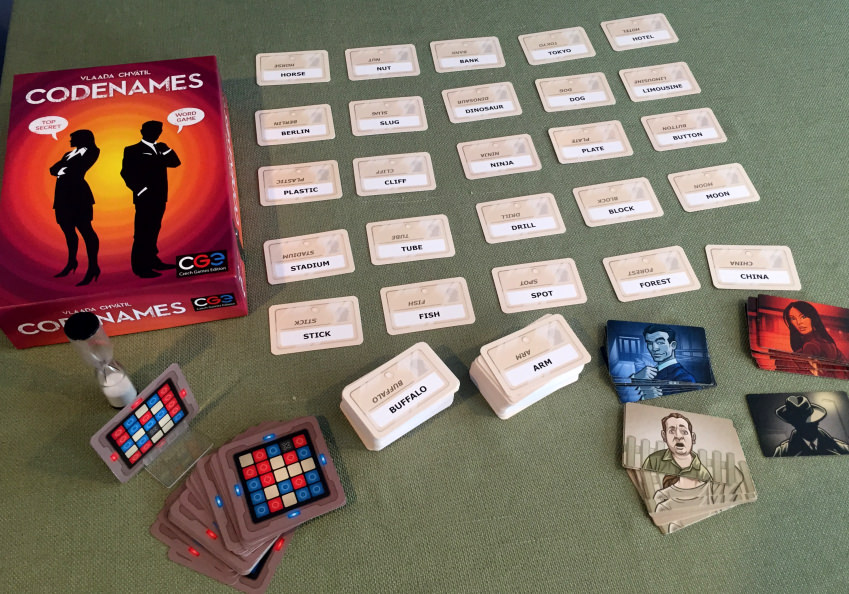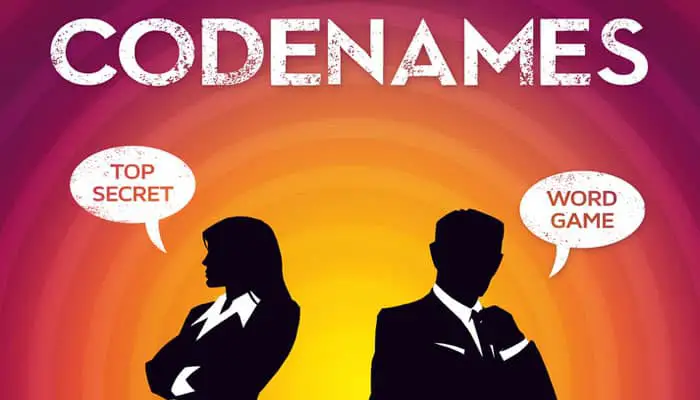Codenames is a 2v2 competitive board game about figuring out how others think and leveraging it to formulate ludicrous word associations. It is best experienced when the members of each team know each other well enough to predict each other’s thought patterns, though the game is still incredibly enjoyable regardless of its players.

The rules of Codenames are incredibly simple:
The premise of the game involves players guessing as many words as they can with as few hints from their Spymaster partners as possible.
To setup, first, the four players must divide into two teams of 2. In those teams, one player must choose to be the Spymaster and the other the Field Operative. The Spymasters from each team should sit on one side of the table, and their partners opposite them on the other side of the table. Then, the players should arrange 25 word tiles on the table in a 5×5 grid. Finally, the spymasters should draw the Key, a card that says which tiles they need their partners to guess.
A team’s turn begins when the Spymaster gives their partner a hint as to what words they should guess. The hint should be in the form of a single word followed by a number representing the number of words on the board that Field Operative should guess based on that word. Then, the Field Operative should guess words one by one until they either guess incorrectly or guess all of the terms of the current hint. If the Field Operative manages to guess all of the terms correctly, they are given a single extra guess, which is useful in case previous turns ended before all of the terms of the hint were guessed.
Players alternate taking turns until either one team guesses all of their terms and wins the game, or one team guesses the secret assassin word and immediately loses the game.

Though simple, this game concept is certainly effective and is great fun. Guessing many words with such minimal hints often leads to convoluted situations where the hints do not directly specify which terms the Field Operatives should guess. When this occurs, Field Operatives are left to reason through the Spymaster’s thought process to make a guess as to the convoluted logic that the Spymaster considered when choosing their hint. Because of these scenarios, the game transforms from a simple word game to a social experience where knowledge of your partner’s personality is the key to victory.
The assassin word is also a fantastic mechanic. The very presence of the assassin on the board provides significant risk to guessers in guessing randomly. Additionally, it urges the Spymasters to choose even more convoluted hints, as oftentimes, there may arise scenarios where a standard hint for some terms could potentially lead the Field Operatives to guess the assassin. Thus, the assassin mechanic increases the social nature of this game, adding to the overall experience.

There are only a couple of minor drawbacks to Codenames.
First, the design of the word cards hurts the overall experience, in my opinion. Due to the nature of the game, both players on either side of the table need to read the word cards frequently throughout the game. Because of this, it makes no sense to me that the designers would choose to make only one orientation of the word stand out while having the other orientation blend in. In the card designs, one orientation of the words is made of large, bold, black text that sits on a white background. However, the other orientation consists of small brown text on a lighter brown background. Due to this design, the larger black text stands out over the smaller brown text, regardless of the orientation of the cards. As a result, players’ eyes are drawn to the black text even when the black text is upside-down relative to the players. Thus, players who see the black text upside down will likely wind up reading the black text upside down the entire game instead of reading the brown text that is in the correct orientation, which defeats the entire purpose of including words in both orientations. I believe the game would greatly improve if the word cards had eye-catching text in both orientations so that players are not forced to put in the additional effort of reading upside down the entire game.
Second and more significantly, many of the more mundane rules that guide the specifics of gameplay feel unnatural and antisocial. First, Spymasters are only permitted to give their hint and confirm the results of their partner’s guess. They are encouraged not to talk or react in any way, as such actions could suggest information in a method separate from the hint, which ruins the purpose of the game. While I understand the purpose of this rule in maintaining the integrity and enforcing the intended experience of the game, it always felt a little uncomfortable for me to hide my emotions and respond in a monotone fashion to the comedic grasping-at-straws guesses of my Field Operative partners. Second, the requirement that Field Operatives need to tap on cards to guess is similarly antisocial and provides even less benefit. The purpose of this rule is to remove ambiguity regarding the guessed term. However, players could just as easily require verbal confirmation, or can simply speak in a clear manner to achieve the same result without discouraging communication through the execution of a core aspect of the game through a nonverbal action.
Both of these rules feel problematic to me because they harm the experience of the game created by the game’s other mechanics. While the guessing mechanics and the assassin transform this simple word game into a social experience and encourage social knowledge and thought, these rules tend towards the opposite experience by limiting socializing and communication. Thus, these rules do not conform to the social experience driven by the other, more important game mechanics.

Still, even though these rules and the odd design decision do hurt the experience, in my opinion, they do not come close to souring the experience to the point of no return. Codenames remains an incredibly fun, social experience and one of my favorite games of this quarter, topped only by the masterpiece that is Forbidden Island.
